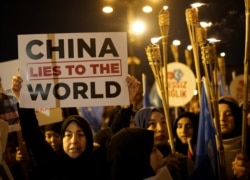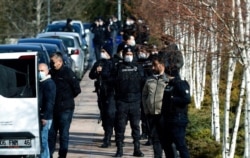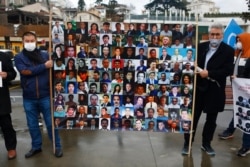Turkey has been a vocal champion for China's Uighur ethnic minority, pressing Beijing to end harsh policies in Xinjiang that then-Prime Minister Recep Tayyip Erdogan called a genocide in 2009.
That stance has shifted in more recent years, with Turkish officials largely abandoning their public criticism of China's Uighur policies, and the Turkish government cracking down on Uighur activists at home.
In January, after months of protests in front of the Chinese consulate in Istanbul by Turkey-based Uighurs trying to find information about missing family members, police banned the gatherings over concerns about security and COVID-19.
Some activists then moved their protests to the Chinese embassy in Ankara, where they demonstrated for several days in early February.
Jevlan Shirmemet, a 30-year-old Uighur activist who has lived in Istanbul since 2011, was among them.
In 2018, Shirmemet lost contact with his mother, Suriye Tursun, a 57-year-old government official from Xinjiang, when she was sent to "Chinese concentration camps" that China calls "reeducation centers" in Xinjiang, he said.
"After my mother's disappearance, I contacted the Chinese embassy for help in reaching out to my mother in 2019, but they have been ignoring my demands," Shirmemet said.
He told VOA that police detained him and three fellow activists for five hours recently, agreeing to release them if they ended their protest outside the diplomatic mission.
"The police arrested four of us including me, kept us in their van and took us to a station to sign papers and released us to our hotel," Shirmemet said, adding that the arrest happened after the Chinese embassy had tweeted the night before that demonstrators were spreading fake news.
Shirmemet and his fellow activists drove back to Istanbul on February 23 with a police escort for part of the journey.
Genocide recognition
On February 22, Canada became the second country after the U.S. to recognize China's actions against Uighurs in Xinjiang as genocide. The Dutch parliament passed a similar motion on February 25.
Although now-President Erdogan called China's actions in Xinjiang a genocide more than a decade ago, the Turkish government never formally weighed in on the issue.
The World Uyghur Congress, the largest Uighur activist group in exile, estimates there are 45,000 Uighur refugees in Turkey, making it one of the largest such diaspora communities in exile.
Uighurs in Turkey say the recent international genocide designations have further encouraged them to continue their activism, pressing Ankara to take a swifter action to address rights abuses in Xinjiang.
For Megpiret Ablimit, a 20-year-old Uighur university student in Istanbul, protesting means trying to save lives dearest to her.
Ablimit says her brother and two uncles are in one of the Xinjiang internment camps, which she calls "concentration camps." She said her grandmother was 63 when she died in such a camp in 2019, two years after Xinjiang authorities had detained her for traveling to Saudi Arabia on a religious visit.
"My relatives' so-called crimes were for either visiting us in Turkey or to go on Islamic pilgrimage," Ablimit told VOA.
Turkish officials criticize protesters
Chinese officials insist that Uighurs have equal rights in the country and their measures in Xinjiang are to counter the "three evils of terrorism, extremism and separatism."
A spokesperson of the Chinese embassy in Ankara told VOA that the Chinese government has been helping the "Chinese compatriots from Xinjiang" contact their relatives. The embassy says the protesters are mainly demonstrating in "an attempt to smear" China.
"It's lawful responsibility for the Turkish policemen to take proper measures to protect the Chinese Embassy and Consulate and maintain order when there is a protest or demonstration nearby," the spokesperson said in a statement to VOA.
Turkish officials also have publicly cast doubt on some of the claims of the protesters.
After the Turkish police stopped Uighur protesters in Ankara, Interior Minister Suleyman Soylu made a statement on February 15, warning the protesters to avoid falling prey to a "planned international conflict that comes beyond the ocean."
Additionally, Omer Celik, the spokesperson for the Turkish ruling party, Justice and Development Party (AKP), said on February 24 that his government has "high sensitivity" for Uighurs' living conditions in China.
Mustafa Akyol, a senior fellow at the Washington-based Cato Institute, says Soylu's suggestion that this issue is a "planned international conflict" highlights how officials are implicating the United States in the Uighur issue, by tying it to Washington's broader competition with China.
"[Turkey's] line is, 'Yes, Uighurs face some hardships, but we will silently do what we can, while not confronting China, against which an American conspiracy is being cooked up,'" Akyol said.
Economic dependence
Other analysts see an economic incentive in Turkey's shifting position on Uighurs, following years in which the Turkish economy has been declining.
Kemal Kirisci, a senior fellow at the Washington-based Brookings Institution, said the Turkish government hopes that investments, trade and credits with China could help salvage its economy.
"Turkey has also chosen to obtain COVID-19 vaccines from China, creating an additional dependence," Kirisci told VOA.
He said a steady flow of vaccines at a price that the Turkish economy can afford requires Ankara to remain largely silent on Uighurs.
VOA's Turkish service contributed to this story.







